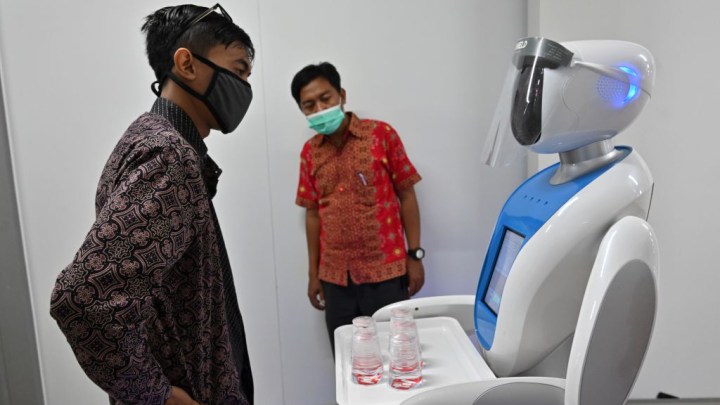
Robots use game theory to understand how we think
Robots use game theory to understand how we think

This is part of our “Econ Extra Credit” project, where we read an introductory economics textbook provided by the nonprofit Core Econ together with our listeners.
Robots are doing their part during the COVID-19 pandemic. They whiz around our hospitals and grocery stores, taking patient temperatures, sanitizing high-touch surfaces and restocking shelves — and they help minimize the amount of human contact required to accomplish it all.
Part of a robot’s job is navigating around the people it encounters.
“The thing about these environments — our roads, our hospital floors — is that they’re not empty. They’re full of people. And so these robots need to choose their actions carefully,” said Anca Dragan, a computer science professor at the University of California, Berkeley. “Because you don’t want these robots bumping into people.”
Which means that robots need to get smart enough about our actions to anticipate what we’re going to do next. They need to understand us, to a certain extent — a tall order if we don’t always understand ourselves.
To model human behavior for these robots, engineers might start with the basic goals that motivate us as we move about public spaces: We walk down the produce aisle looking for asparagus, or we’re trying to get through an intersection before the light turns red.
“This is very much borrowed from economics, where we model human behavior there as responding to these incentives or utilities,” Dragan told “Marketplace Morning Report” host David Brancaccio.
But our environment can influence our behavior. If a car turns into our lane up ahead, we might slow down, even if it means missing that light.
The easiest thing to do is what traditional economics does, which is to assume that people are these perfect little game players; they’re perfect optimizers; they’re perfect utility maximizers — and we’re not.
Anca Dragan
Enter game theory, a bedrock principle of behavioral economics.
“Game theory comes from the fact that neither the human nor the robot make decisions about what to do in pursuit of their goals in a vacuum. They’re aware of each other,” Dragan said. “There comes this tension: What people do influences what the robot does; what the robot does influences what people do. It’s this back and forth. It’s kind of a negotiation.”
The tools of game theory allow robots to account for the ways people might change course because of the presence or actions of others. And anticipating human action efficiently enables robots to make progress toward their own goals, too.
But game theory relies on rational actors — and sometimes, human behavior can seem irrational to the onlooker.
“One thing that makes all of this very challenging is that once you think about it in this game theoretic terms, the easiest thing to do is what traditional economics does, which is to assume that people are these perfect little game players; they’re perfect optimizers; they’re perfect utility maximizers — and we’re not. And behavioral economics has told us that for a long time,” Dragan said.
Take, for example, somebody who sells their stocks when the stock market crashes. Instead of assuming that they are fundamentally irrational, or they don’t care about losing money, we might instead consider the beliefs that could have motivated the action. We might need to tweak our model. Selling your stocks when the market is down appears far more rational if you think the market will fall even further in the future.
Dragan says it is important to teach robots how to follow this sort of reasoning.
“They should look at an action and not impart their own understanding of the world on the person, [or] expect the person to be rational under the robot’s view of the world,” she said.
It’ll help robots understand us better, so they can help us better.
There’s a lot happening in the world. Through it all, Marketplace is here for you.
You rely on Marketplace to break down the world’s events and tell you how it affects you in a fact-based, approachable way. We rely on your financial support to keep making that possible.
Your donation today powers the independent journalism that you rely on. For just $5/month, you can help sustain Marketplace so we can keep reporting on the things that matter to you.

















